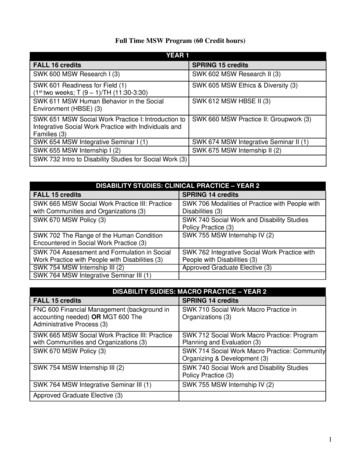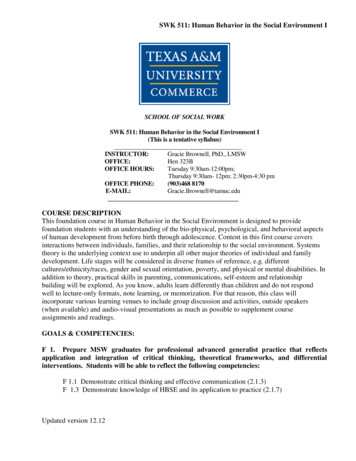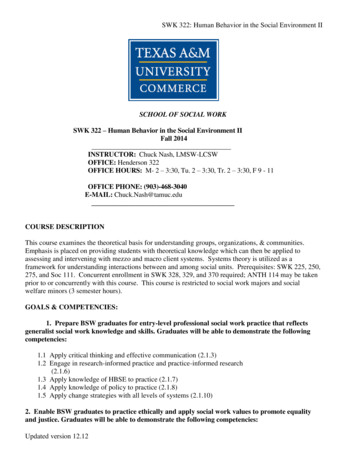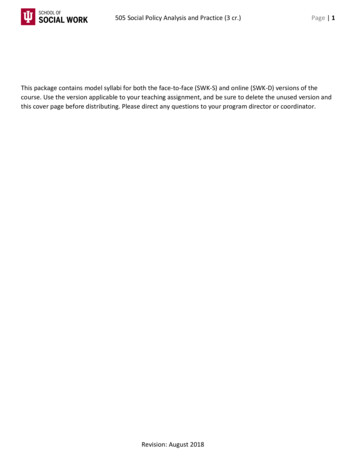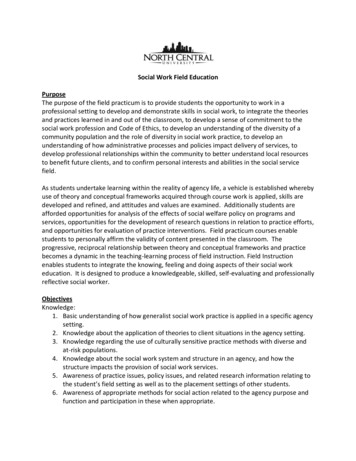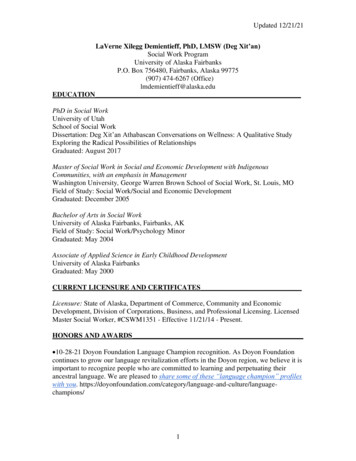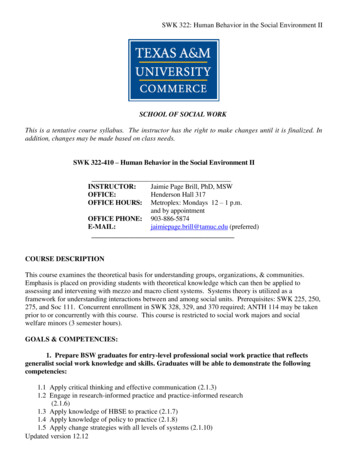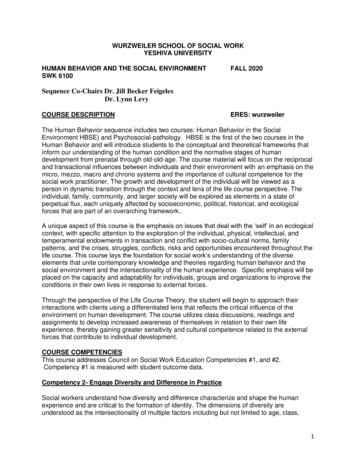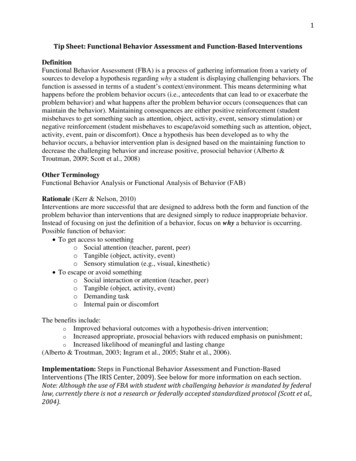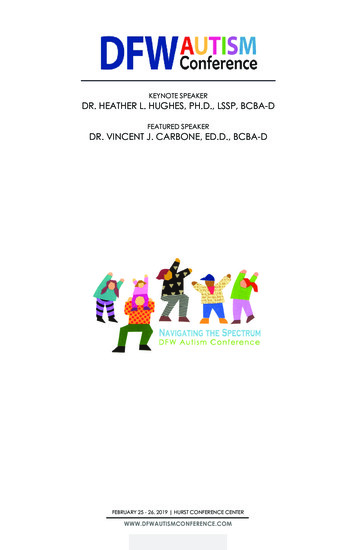
Transcription
SWK 3307HUMAN BEHAVIOR IN SOCIALENVIRONMENT IArcher College of Health andHuman ServicesSummer 2022Instructor: Ingrid A. Russo, M.S.W., LCSW; BSW Program Director/ClinicalAssistant ProfessorEmail: Ingrid.Russo@angelo.eduPhone: 325-486-6126Office: Archer College of Health and Human Services, Room 224KOffice Hours: Virtual Appointments available upon requestCourse InformationCourse DescriptionThe biopsychosocial science base of social work practice. Includes theories of biological, social, cultural,psychological, and spiritual development within the context of the social environment through the lifecourse. Focuses on the critical evaluation and application of theories and knowledge to personenvironment transactions. Prerequisite: SWK 2307 and Admission into the SWK Degree Program or aDeclared SWK Minor.Course CreditsThis course is offered online for 3 credit hoursPrerequisite and Co-requisite CoursesPrerequisite: SWK 2307 and admission into the social work program or a declared minor in social work.Prerequisite SkillsAccessing Internet websites, using ASU Library resources, and proficiency with Microsoft Wordand/or PowerPoint are expectations of the social work program.Program OutcomesUpon completion of the program of study for the BSW program, the graduate will be prepared tounderstand the value base of the profession and its ethical standards, as well as relevant laws andregulations that may impact practice at the micro, mezzo, and macro levels; understand
frameworks of ethical decision-making and how to apply principles of critical thinking to thoseframeworks in practice, research, and policy arenas; recognize personal values and the distinctionbetween personal and professional values; understand how their personal experiences andaffective reactions influence their professional judgment and behavior; understand the profession’shistory, its mission, and the roles and responsibilities of the profession; understand the role of otherprofessions when engaged in inter-professional teams; recognize the importance of life-longlearning and are committed to continually updating their skills to ensure they are relevant andeffective; and understand emerging forms of technology and the ethical use of technology in socialwork practiceStudent Learning OutcomesCompetency 1: Demonstrate Ethical and Professional BehaviorSocial workers understand the value base of the profession and its ethical standards, as well as relevantlaws and regulations that may impact practice at the micro, mezzo, and macro levels. Social workersunderstand frameworks of ethical decision-making and how to apply principles of critical thinking tothose frameworks in practice, research, and policy arenas. Social workers recognize personal values andthe distinction between personal and professional values. They also understand how their personalexperiences and affective reactions influence their professional judgment and behavior. Social workersunderstand the profession’s history, its mission, and the roles and responsibilities of the profession.Social Workers also understand the role of other professions when engaged in inter-professional teams.Social workers recognize the importance of life-long learning and are committed to continually updatingtheir skills to ensure they are relevant and effective. Social workers also understand emerging forms oftechnology and the ethical use of technology in social work practice.Competency 2: Engage Diversity and Difference in PracticeSocial workers understand how diversity and difference characterize and shape the human experienceand are critical to the formation of identity. The dimensions of diversity are understood as theintersectionality of multiple factors including but not limited to age, class, color, culture, disability andability, ethnicity, gender, gender identity and expression, immigration status, marital status, politicalideology, race, religion/spirituality, sex, sexual orientation, and tribal sovereign status. Social workersunderstand that, as a consequence of difference, a person’s life experiences may include oppression,poverty, marginalization, and alienation as well as privilege, power, and acclaim. Social workers alsounderstand the forms and mechanisms of oppression and discrimination and recognize the extent towhich a culture’s structures and values, including social, economic, political, and cultural exclusions, mayoppress, marginalize, alienate, or create privilege and power.Competency 4: Engage In Practice-informed Research and Research-informed Practice(The instructor reserves the right to modify this syllabus throughout the semester if necessary.)
Social workers understand quantitative and qualitative research methods and their respective roles inadvancing a science of social work and in evaluating their practice. Social workers know the principles oflogic, scientific inquiry, and culturally informed and ethical approaches to building knowledge. Socialworkers understand that evidence that informs practice derives from multi-disciplinary sources andmultiple ways of knowing. They also understand the processes for translating research findings intoeffective practice.Competency 6: Engage with Individuals, Families, Groups, Organizations, and CommunitiesSocial workers understand that engagement is an ongoing component of the dynamic and interactiveprocess of social work practice with, and on behalf of, diverse individuals, families, groups,organizations, and communities. Social workers value the importance of human relationships. Socialworkers understand theories of human behavior and the social environment, and critically evaluate andapply this knowledge to facilitate engagement with clients and constituencies, including individuals,families, groups, organizations, and communities. Social workers understand strategies to engagediverse clients and constituencies to advance practice effectiveness. Social workers understand howtheir personal experiences and affective reactions may impact their ability to effectively engage withdiverse clients and constituencies. Social workers value principles of relationship-building and interprofessional collaboration to facilitate engagement with clients, constituencies, and other professionalsas appropriate.Competency 7: Assess Individuals, Families, Groups, Organizations, and CommunitiesSocial workers understand that assessment is an ongoing component of the dynamic and interactiveprocess of social work practice with, and on behalf of, diverse individuals, families, groups,organizations, and communities. Social workers understand theories of human behavior and the socialenvironment, and critically evaluate and apply this knowledge in the assessment of diverse clients andconstituencies, including individuals, families, groups, organizations, and communities. Social workersunderstand methods of assessment with diverse clients and constituencies to advance practiceeffectiveness. Social workers recognize the implications of the larger practice context in the assessmentprocess and value the importance of inter-professional collaboration in this process. Social workersunderstand how their personal experiences and affective reactions may affect their assessment anddecision-making.Competency 8: Intervene with Individuals, Families, Groups, Organizations, and CommunitiesSocial workers understand that intervention is an ongoing component of the dynamic and interactiveprocess of social work practice with, and on behalf of, diverse individuals, families, groups,organizations, and communities. Social workers are knowledgeable about evidence-informedinterventions to achieve the goals of clients and constituencies, including individuals, families, groups,organizations, and communities. Social workers understand theories of human behavior and the socialenvironment, and critically evaluate and apply this knowledge to effectively intervene with clients and(The instructor reserves the right to modify this syllabus throughout the semester if necessary.)
constituencies. Social workers understand methods of identifying, analyzing and implementingevidence-informed interventions to achieve client and constituency goals. Social workers value theimportance of interprofessional teamwork and communication in interventions, recognizing thatbeneficial outcomes may require interdisciplinary, interprofessional, and inter-organizationalcollaboration.Competency 9: Evaluate Practice with Individuals, Families, Groups, Organizations, and CommunitiesSocial workers understand that evaluation is an ongoing component of the dynamic and interactiveprocess of social work practice with, and on behalf of, diverse individuals, families, groups, organizationsand communities. Social workers recognize the importance of evaluating processes and outcomes toadvance practice, policy, and service delivery effectiveness. Social workers understand theories ofhuman behavior and the social environment, and critically evaluate and apply this knowledge inevaluating outcomes. Social workers understand qualitative and quantitative methods for evaluatingoutcomes and practice effectiveness.Student Learning OutcomeBy completing all courserequirements, students will beable to: DemonstrateEthical andProfessionalBehavior Engage Diversityand Difference inPracticeEngage InPractice-informedResearch andResearchinformed PracticeEngage withIndividuals,Families, Groups,Organizations,and Communities Assignment(s) or activity(ies)validating outcome achievement: Final paper, discussionsMapping to Program OutcomesCompetency 1,2,4, 6,7,8 and9AssessIndividuals,Families, Groups,Organizations,and Communities(The instructor reserves the right to modify this syllabus throughout the semester if necessary.)
Student Learning OutcomeBy completing all courserequirements, students will beable to: Intervene withIndividuals,Families, Groups,Organizations,and Communities Evaluate Practicewith Individuals,Families, Groups,Organizations,and CommunitiesSocial DemonstrateEthical andProfessionalBehavior Engage Diversityand Difference inPractice DemonstrateEthical andProfessionalBehavior Engage InPractice-informedResearch andResearchinformed Practice Engage withIndividuals,Families, Groups,Organizations,and Communities AssessIndividuals,Families, Groups,Assignment(s) or activity(ies)validating outcome achievement:Mapping to Program Outcomesfinal paper, discussionsCompetency 1 and 2Exams, final paper, discussionsCompetency 1, 4, 6, 7, 8, and9(The instructor reserves the right to modify this syllabus throughout the semester if necessary.)
Student Learning OutcomeBy completing all courserequirements, students will beable to:Assignment(s) or activity(ies)validating outcome achievement:Mapping to Program OutcomesOrganizations,and Communities Intervene withIndividuals,Families, Groups,Organizations,and Communities Evaluate Practicewith Individuals,Families, Groups,Organizations,and CommunitiesSocialCourse DeliveryThis is an online course with learning resources and supplemental materials posted inBlackboard. All testing will be done through Respondus Testing and webcam monitor.Required Texts and MaterialsHutchison, E. D. (2015). Dimensions of human behavior: The changing life course (6th ed.). ThousandOaks, CA: SAGE Publications. ISBN-13: 978-1544339344 ISBN-10: 1544339348American Psychological Association. (2019). Publication manual of the American PsychologicalAssociation (7th ed.). Washington, DC: APA. ISBN: 978-1-433-83216-1NOTE: All assignments submitted in this course are to be written in strict accordance with thePublication Manual of the American Psychological Association (7th ed.).(The instructor reserves the right to modify this syllabus throughout the semester if necessary.)
Recommended Texts, Links and Materials NASW Code of fault.asp Texas Occupation Code. (2005, September 1). Texas occupations code, chapter 505, social workpractice act. Retrieved April, 13, 2020, from http://www.dshs.state.tx.us/socialwork/swlaw.pdf Texas State Board of Social Worker Examiners Scope of Practice. (2011, January 27). Rulesrelating to the regulation of social workers. Retrieved April, 13, 2020, fromhttp://www.dshs.state.tx.us/socialwork/sw rules.pdfTechnology RequirementsTo successfully complete this course, students need the following:Access to a computer with either a Mac or Windows Operating System or ChromebookHigh speed Internet accessEthernet cable (It is highly recommended by IT that you plug into a routerusing an Ethernet cable when testing so that you don’t lose connection bywifi drop.) Webcam (A plug-in webcam allows the student to perform thorough environmentalscans.)To participate in one of ASU’s distance education programs, you need this technology: A computer capable of running Windows 7 or later, or Mac OSX 10.8 or laterThe latest version of one of these web browsers: internet Explorer, Firefox, or SafariMicrosoft Office Suite or a compatible Open Office SuiteAdobe Acrobat ReaderHigh Speed Internet AccessEthernet adapter cable required (wireless connections can drop during tests andCollaborate sessions)WebcamTopic OutlineSee Blackboard for Module OutlineCommunicationFaculty will respond to email and/or telephone messages within 24 hours during working hoursMonday through Friday. Weekend messages may not be returned until Monday.Written communication via email: All private communication will be done exclusively throughyour ASU email address. Check frequently for announcements and policy changes. In youremails to faculty, include the course name and section number in your subject line.(The instructor reserves the right to modify this syllabus throughout the semester if necessary.)
Virtual communication: Office hours and/or advising may be done with the assistance of thetelephone, Collaborate, Skype, etc.GradingEvaluation and GradesCourse grades will be determined as indicated in the table below.AssessmentPercent/Points of TotalGradeHBSE I Application Paper40 %Discussions20 %Exams40%Total100%Grading SystemCourse grades will be dependent upon completing course requirements and meeting thestudent learning outcomes.The following grading scale is in use for this course:A 90.00-100 pointsB 80.00-89.99 pointsC 70.00-79.99 pointsD 60.00-69.99 pointsF 0-59.99 points (Grades are not rounded up)Teaching StrategiesStudents are expected to be “active learners.” It is a basic assumption of the instructor thatstudents will be involved (beyond the materials and lectures presented in the course)discovering, processing, and applying the course information using peer-review journal articles,researching additional information and examples on the Internet, and discussing coursematerial and clinical experiences with their peers.(The instructor reserves the right to modify this syllabus throughout the semester if necessary.)
Assignment and Activity DescriptionsHBSE I Application Paper40%Each student will write a paper based on a case study that will be supplied by the instructor and applyconcepts of Human Behavior in the Social Environment (HBSE) learned in this course with adevelopmental (life course)-ecological framework in mind. Each paper will adhere to the most recentAPA guidelines, will be approximately 6-8 pages in length including the title and reference page, andmust contain a discussion of the following:I.II.III.IV.V.VI.DiscussionsIntroduction of the Case StudyDiscussion and Application of HBSE Life Course Perspective Concepts and Themes toUnderstand PIE Transactions, student will choose (3) Concepts and (3) Themeswhich will be applied to their case study along with their ethical reasoning of whythey choose those concepts and themesHow Socio-Cultural Variables (i.e., those that affect the client, the social worker, andpotential others) influence HBSEA Critical Evaluation of the Forms and Mechanisms of Oppression andDiscrimination that may affect HBSEApplication of HBSE Conceptual Frameworks to Guide the Process of Assessment,Intervention, and EvaluationConclusion and References (7 references)20%This is relevant to participation in completing discussions and giving peer feedback on posts in atimely manner, engaging in all course activities, and having professional and respectfulcommunication with professor and peers; and so forth. The expectation for students in a socialwork program is that they are motivated to learn and are dedicated to their studies.Students answer the discussion posts that is open for each week (no less than 500 words andtwo references), the due dates for the discussion posts are on the course schedule, you mustalso answer two peer’s posts with substantive feedback (at least four sentences and onereference). The discussion posts will either be regarding something we learned from the weekslecture, a case study, journal and/or news article or other media outlet, etc. The grading for thediscussion posts are as follows: I am grading you on the frequency with which you are answeringthe discussion post (did you do the post on the date required and give feedback to peer onrequired day), initial assignment post (did you answer the question in its entirety, do you have atleast two references to support your answer), follow up postings (substantive feedback to atleast two peers that is longer than two sentences), content contribution (did you add your ownthoughts and/or other information not just copied exactly from the textbook and contributed tothe information already researched), did you add two peer reviewed works as your citations thisis your references and support for your post, and lastly your clarity and mechanics (are there(The instructor reserves the right to modify this syllabus throughout the semester if necessary.)
misspellings, grammar issues, apa issues, etc). If all these sections are met then you get 40points for each discussion post.Examinations40%There will be four (4) exams for this class. Each of the exams will be administered via Blackboardusing the Respondus Monitor and LockDown browser. You may not use notes, PowerPointlectures, textbooks, or other materials to take the exam. Each exam will give you one attemptand time limited.Assignment SubmissionAll assignments MUST be submitted through the Assignments link in the Blackboard site. This isfor grading, documenting, and archiving purposes. Issues with technology use arise from timeto time. If a technology issue does occur regarding an assignment submission, email me atirusso@angelo.edu and attach a copy of what you are trying to submit. Please contact the ITService Center at (325) 942-2911 or go to your Technology Support tab to report the issue. Thislets your faculty know you completed the assignment on time and are just having problemswith the online submission feature in Blackboard. Once the problem is resolved, submit yourassignment through the appropriate link. This process will document the problem and establisha timeline. Be sure to keep a backup of all work.Late Work or Missed Assignments PolicyPOLICY ON LATE OR MISSED ASSIGNMENTSAssignments: Due to the extreme fast pace in the summer, no late assignments will beaccepted. Time doesn’t permit in order for grades to be submitted.Exams and Discussions: NOT ACCEPTED LATE FOR ANY REASONThe week begins on Monday and ends on Sunday. All test, assignments and other due dateswill be SUNDAY at 11:59pmGeneral Policies Related to This CourseAll students are required to follow the policies and procedures presented in these documents: Angelo State University Student Handbook 1Angelo State University Catalog 2(The instructor reserves the right to modify this syllabus throughout the semester if necessary.)
Student Responsibility and AttendanceStudents are responsible for completing and engaging in class discussions. Any missed discussionswill affect your overall grade.Online: This class is asynchronous, meaning you do not have to be on-line at a certain time.There are readings which you will have to complete to be able to adequately participate inindividual and group assignments. In order to complete this course successfully, you do have toparticipate in all course activities i.e. discussion boards, course projects, reflective logs, etc.Students are expected to engage in course activities and submit work by due dates and times.The hope is that students will make substantive contributions which reflect integration ofassigned materials as well as any outside readings as appropriate. Scholarly contribution is anexpectation. For planning purposes, this class will probably require a minimum of 6-9 studyhours per week on average.Academic IntegrityStudents are expected to maintain complete honesty and integrity in all work. Any studentfound guilty of any form of dishonesty in academic work is subject of disciplinary action andpossible expulsion from ASU.The College of Health and Human Services adheres to the university’s Statement of AcademicIntegrity. 3Accommodations for Students with DisabilitiesASU is committed to the principle that no qualified individual with a disability shall, on the basisof disability, be excluded from participation in or be denied the benefits of the services,programs or activities of the university, or be subjected to discrimination by the university, asprovided by the Americans with Disabilities Act of 1990 (ADA), the Americans with DisabilitiesAct Amendments of 2008 (ADAAA) and subsequent legislation.Student Disability Services is located in the Office of Student Affairs, and is the designatedcampus department charged with the responsibility of reviewing and authorizing requests forreasonable accommodations based on a disability. It is the student’s responsibility to initiatesuch a request by contacting an employee of the Office of Student Affairs, in the Houston HarteUniversity Center, Room 112, or contacting the department via email at ADA@angelo.edu. Formore information about the application process and requirements, visit the Student DisabilityServices website.4 The employee charged with the responsibility of reviewing and authorizingaccommodation requests is:Dallas SwaffordDirector of Student Disability Services(The instructor reserves the right to modify this syllabus throughout the semester if necessary.)
Office of Student on Harte University Center, Room 112Incomplete Grade PolicyIt is policy that incomplete grades be reserved for student illness or personal misfortune. Pleasecontact faculty if you have serious illness or a personal misfortune that would keep you fromcompleting course work. Documentation may be required. See ASU Operating Policy10.11 Grading Procedures 5 for more information.PlagiarismPlagiarism is a serious topic covered in ASU’s Academic Integrity policy 6 in the StudentHandbook. Plagiarism is the action or practice of taking someone else’s work, idea, etc., andpassing it off as one’s own. Plagiarism is literary theft.In your discussions and/or your papers, it is unacceptable to copy word-for-word withoutquotation marks and the source of the quotation. It is expected that you will summarize orparaphrase ideas giving appropriate credit to the source both in the body of your paper and thereference list.Papers are subject to be evaluated for originality. Resources to help you understand this policybetter are available at the ASU Writing Center. 7Student Absence for Observance of Religious Holy DaysA student who intends to observe a religious holy day should make that intention known inwriting to the instructor prior to the absence. See ASU Operating Policy 10.19 Student Absencefor Observance of Religious Holy Day8 for more information.Copyright PolicyStudents officially enrolled in this course should make only one printed copy of the given articlesand/or chapters. You are expressly prohibited from distributing or reproducing any portion ofcourse readings in printed or electronic form without written permission from the copyright holdersor publishers.Syllabus ChangesThe faculty member reserves the option to make changes as necessary to this syllabus and thecourse content. If changes become necessary during this course, the faculty will notify students of(The instructor reserves the right to modify this syllabus throughout the semester if necessary.)
such changes by email, course announcements and/or via a discussion board announcement. It isthe student’s responsibility to look for such communications about the course on a daily basis.Title IX at Angelo State UniversityAngelo State University is committed to providing and strengthening an educational, working,and living environment where students, faculty, staff, and visitors are free from sexdiscrimination of any kind. In accordance with Title VII, Title IX, the Violence Against WomenAct (VAWA), the Campus Sexual Violence Elimination Act (SaVE), and other federal and statelaws, the University prohibits discrimination based on sex, which includes pregnancy, and othertypes of Sexual Misconduct. Sexual Misconduct is a broad term encompassing all forms ofgender-based harassment or discrimination and unwelcome behavior of a sexual nature. Theterm includes sexual harassment, nonconsensual sexual contact, nonconsensual sexualintercourse, sexual assault, sexual exploitation, stalking, public indecency, interpersonalviolence (domestic violence or dating violence), sexual violence, and any other misconductbased on sex.You are encouraged to report any incidents involving sexual misconduct to the Office of Title IXCompliance and the Director of Title IX Compliance/Title IX Coordinator, Michelle Boone, J.D.You may submit reports in the following manner:Online: www.angelo.edu/incident-formFace to face: Mayer Administration Building, Room 210Phone: 325-942-2022Email:michelle.boone@angelo.eduNote, as a faculty member at Angelo State, I am a mandatory reporter and must reportincidents involving sexual misconduct to the Title IX Coordinator. Should you wish to speak tosomeone in confidence about an issue, you may contact the University Counseling Center (325942-2371), the 24-Hour Crisis Helpline (325-486-6345), or the University Health Clinic (325-9422171).For more information about resources related to sexual misconduct, Title IX, or Angelo State’spolicy please visit: www.angelo.edu/title-ix.(The instructor reserves the right to modify this syllabus throughout the semester if necessary.)
Course ScheduleWeek/DateTopic/Assignments/Assessments DUEWelcome! Module 1 Introduction to CourseDUE July 13th by 11:59 PM* Review START HERE page Review Course Syllabus and ASU Honor Code.Select “Mark Reviewed” to agree to terms of thecourse and ASU’s policies and access coursecontent.Post: Self-Introduction (Discussion tab) and first discussionpost (located in Groups Discussion Tab) must becompleted by everyoneWeek 1: July 11-15Week 2: July 18-22Reading- Chapters 1 and 2 (Hutchison text) and reviewpower point lectures for chapters.Due: Self-introduction (DueWednesday), no peerfeedback needed.Due: Module 1 DiscussionPost due Thursday fororiginal post and peerfeedback (2 peers) dueSaturday by 11:59 pm.(Students will have pointsdeducted if original post islate).Reading: Chapters 3-5. and review power point lecturesfor chapters.Due: Exam 1: Chapters 1 and 2 open Friday til Sunday,respondus lockdown browser, one attempt, notextbook or notes can be utilized.Due: Module 2 Discussion Post due Thursday fororiginal post and peer feedback due Saturday by 11:59pm. (Students will have points deducted if original postis late).Course Schedule Continued on next page(The instructor reserves the right to modify this syllabus throughout the semester if necessary.)
Week/DateTopic/Assignments/Assessments DUEReading: Chapters 6-8, watch/review power pointlectures on chapters.Week 3: July 25-29Due: Exam 2 (Chapters 3-5) Opens Friday to Sunday 11:59pm, Respondus lockdown, one attempt, nonotes/textbook.Due: Module 3 Discussion Post due Thursday for originalpost and peer feedback due Saturday by 11:59 pm.(Students will have points deducted if original post is late).Reading: Chapters 9-10, watch/review power pointlectures on chapters.Collaborate on August 2nd at 11am to discuss paper.Week 4: Aug 1-5Due: Exam 3 (Chapters 6-8) Opens Friday to Sunday at11:59 pm, respondus lockdown, one attempt, nonotes/textbook may be used.Due: HBSE Application/Final Paper Due Friday the 5th at5pm.Due: Module 4 Discussion Post due Monday the 8th fororiginal post and peer feedback due Wednesday the 10thby 11:59 pm. (Students will have points deducted iforiginal post is late).Week 5: Aug 8-12Final Exam Due: Chapters 9 and 10, August 8th to the 10that 11:59 pm, respondus lockdown, one attempt, nonotes/textbook may be used.·(The instructor reserves the right to modify this syllabus throughout the semester if necessary.)
Student Evaluation of Faculty and CourseStudents in all programs are given the opportunity to evaluate their courses and the facultywho teach them. Evaluations are most helpful when they are honest, fair, constructive, andpertinent to the class, clinical experience, or course. Faculty value student evaluations, and usestudent suggestions in making modifications in courses, labs and clinical experiences.Angelo State University uses the IDEA (Individual Development and Educational Assessment)system administered through Kansas State University for all course evaluations. The Office ofInstitutional Research and Assessment administers IDEA for the entire university, online andhas established a policy whereby students can complete course evaluations free from coercion.End of tps://www.angelo.edu/catalogs/3 policies/academic-integrity.php4 s/5 https://angelo.policystat.com/policy/11803007/
organizations, and communities. Social workers value the importance of human relationships. Social workers understand theories of human behavior and the social environment, and critically evaluate and apply this knowledge to facilitate engagement with clients and constituencies, including individuals, families, groups, organizations, and .
